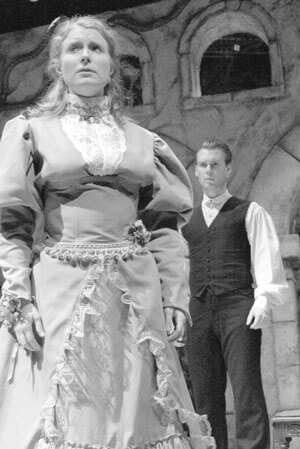A Lorca play underscores the timelessness of themes harrowing to experience
in “ Doña Rosita, the Spinster.”
The abiding power of the plays of Frederico Garcia Lorca (1898-1936) has always been their poeticism. Lorca’s plays use classic structures to explore modern issues, very often the tragedies of abandonment, disillusionment, and despair, played out against a changing social order. Decidedly apolitical in the face of Franco’s oppression, the gay Lorca created great dramas that defy naturalism, though they are, on the surface, realistic stories.
The complex emotions of the characters are at once visceral and removed, textured by poetic abstraction and yet emotionally searing and the plays derive as much theatrical power from the literary form as they do from the story.
Lorca’s stories are never upbeat—death always comes in blood feuds, suicides, and attacks—yet they are rich in character and perspective, buoyed by comic moments and a sense of external life, though the outside world is almost always held at bay, almost as a hedge against reality.
That is certainly one of the themes of “Doña Rosita, the Spinster,” now being given a rare and intriguing production by the Jean Cocteau Repertory. Rosita is a woman who has promised to marry the man she loves. Before he marries her, however, he must leave to take care of family business far away. He promises to come back, and Rosa says she’ll wait.
And wait she does, for 25 years, hiding from the truth that he will never return by staying locked in her home so she can pretend that time is not passing, that “the day he comes back will be like the first day he was gone.” By sheer force of will she removes herself from life, and only at the end realizes that though living still, she is spiritually dead.
The play is structured in three short acts, each an epic poem in its own right. Together the parts reflect one of the consistent images of the play—the “Rosa Mutabile,” a rose cultivated by Rosita’s uncle whose one-day life begins with a dawn burst of red before turning white in the afternoon before its petals fall with nightfall.
The first act is a relatively direct treatise on the power of love, in which Rosita promises herself to her second cousin. The second, which centers on a discussion of “the language of flowers,” explores how we as humans use abstraction to avoid direct expression of truth. And the third is a grim reminder that no matter what barriers of artifice we have built, at some point the real truth of life—death, decay, and loss—must inevitably be confronted. Compelling to be sure, and also inspiring in the way Gwynne Edwards has adapted this seldom-produced play.
This is a highly intelligent production and the design is nothing but brilliant, considering the limited size of the Cocteau stage. Sets by Roman Tatarowicz, costumes by Margaret McKowen, and lighting by David Kniep reveal an overriding intelligence and understanding of the play fluidly expressed through color and movement.
Against this backdrop, the talented company consistently finds the souls of the characters within the artistry of the poetry. In particular, Elise Stone as Rosita’s aunt is marvelous. Her character is our touchstone with the world outside and the passage of time, yet Stone gives her a center and vibrancy that is as exciting as it is subtle. Eileen Glenn as the housekeeper is likewise focused and quirkily lyrical, and Craig Smith as Rosita’s uncle is charming—a lost man in a world that is dominated by women.
As Rosita, Amanda Jones is for the most part very strong. One would wish that her third act catharsis was bigger and more theatrical. The language allows for it, and as an audience we almost need it so that we see, if only for a moment, what the cost has been to the woman who is now Doña Rosita. Jones certainly has the skill for it as the rest of her finely calibrated performance reveals, and director Ernest Johns, whose work in the rest of the play is wonderful, should consider encouraging Jones to grasp the breadth of her role-playing ability.
Nonetheless, that is a small note in what is otherwise a remarkably rewarding evening. Moreover, one is reminded how lucky we are to have a company like the Jean Cocteau that is willing and able to bring these plays to us.



































